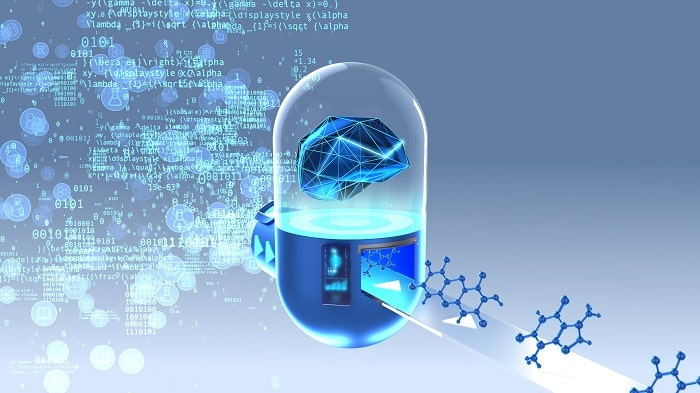
Leave a Message
We will call you back soon!
 Your message must be between 20-3,000 characters!
Your message must be between 20-3,000 characters!
 Please check your E-mail!
Please check your E-mail!

KS-V Peptide has an expert team of structural biologists with strong academic and industrial experience and can offer high-quality structural biology services to pharmaceuticals, biotechnology companies, and research institutions. Our team's expertise and state-of-the-art technology allow us to provide unparalleled services that meet the needs of our clients.

A drastic increase of development in the field of artificial intelligence (AI) technologies promoted drug design. AI solutions can improve the predictability, speed, and accuracy of drug discovery, and ultimately accelerate the productivity of the entire drug development process.
KS-V has been adopting various strategies to actively integrate AI technologies into the drug discovery process. We have established a cross-functional team composed of biologists, chemists, data scientists, and AI experts. We can utilize your specific research data and drug target information to build models for screening and optimizing molecule candidates.

Docking peptides to the target and scoring the binding conformations, retaining the results with the best scores, and continuing to search for better sequences based on previous results. Repeating the process until the scoring does not change significantly, finally obtaining the target molecule. Combining AI-assisted drug discovery with lab automation, high-throughput screening, and other technologies can further enhance the drug discovery process by increasing its efficiency and reducing the time and costs involved.
The specific process is to screen dozens to hundreds of active drug molecules from massive samples by computer, and then carry out further detection, and optimize on the computer, including chemical synthesis of different active molecules, and then put into biological measurement, repeat several cycles. This method can shorten the screening time by tens of times and increase the success rate by tens of percentage points.
It includes AI prediction of new drug targets, establishment of multi-billion level virtual drug molecular library, computer high-appropriate screening of massive molecular library, drug molecular toxicity prediction, drug molecular biological activity prediction, drug target prediction, target protein structure prediction, drug molecular adaptation profile measurement, drug molecular crystal shape prediction, etc.
According to reports, the occurrence of disease is usually a mutation or abnormal function of a certain protein in the body, and developers have to design for the abnormal target protein and screen out drug molecules that can reactivate its function.
Traditional robotic high-throughput screening requires screening out certain types of drug molecules with therapeutic potential from tens of thousands to millions of them. Although this method is more efficient than manual screening, it is still not fast enough, and screening often takes months or even years. In addition, buying large quantities of drug molecules for screening costs at least several million dollars. The application of computer and artificial intelligence to the preclinical development of new drugs can create virtual molecular libraries, which not only save the cost of purchasing drug molecules, but also make molecular samples more diverse.

KS-V Peptide has an expert team of structural biologists with strong academic and industrial experience and can offer high-quality structural biology services to pharmaceuticals, biotechnology companies, and research institutions. Our team's expertise and state-of-the-art technology allow us to provide unparalleled services that meet the needs of our clients.

A drastic increase of development in the field of artificial intelligence (AI) technologies promoted drug design. AI solutions can improve the predictability, speed, and accuracy of drug discovery, and ultimately accelerate the productivity of the entire drug development process.
KS-V has been adopting various strategies to actively integrate AI technologies into the drug discovery process. We have established a cross-functional team composed of biologists, chemists, data scientists, and AI experts. We can utilize your specific research data and drug target information to build models for screening and optimizing molecule candidates.

Docking peptides to the target and scoring the binding conformations, retaining the results with the best scores, and continuing to search for better sequences based on previous results. Repeating the process until the scoring does not change significantly, finally obtaining the target molecule. Combining AI-assisted drug discovery with lab automation, high-throughput screening, and other technologies can further enhance the drug discovery process by increasing its efficiency and reducing the time and costs involved.
The specific process is to screen dozens to hundreds of active drug molecules from massive samples by computer, and then carry out further detection, and optimize on the computer, including chemical synthesis of different active molecules, and then put into biological measurement, repeat several cycles. This method can shorten the screening time by tens of times and increase the success rate by tens of percentage points.
It includes AI prediction of new drug targets, establishment of multi-billion level virtual drug molecular library, computer high-appropriate screening of massive molecular library, drug molecular toxicity prediction, drug molecular biological activity prediction, drug target prediction, target protein structure prediction, drug molecular adaptation profile measurement, drug molecular crystal shape prediction, etc.
According to reports, the occurrence of disease is usually a mutation or abnormal function of a certain protein in the body, and developers have to design for the abnormal target protein and screen out drug molecules that can reactivate its function.
Traditional robotic high-throughput screening requires screening out certain types of drug molecules with therapeutic potential from tens of thousands to millions of them. Although this method is more efficient than manual screening, it is still not fast enough, and screening often takes months or even years. In addition, buying large quantities of drug molecules for screening costs at least several million dollars. The application of computer and artificial intelligence to the preclinical development of new drugs can create virtual molecular libraries, which not only save the cost of purchasing drug molecules, but also make molecular samples more diverse.